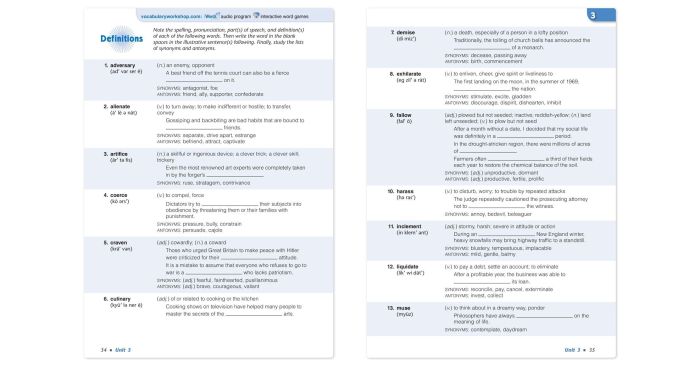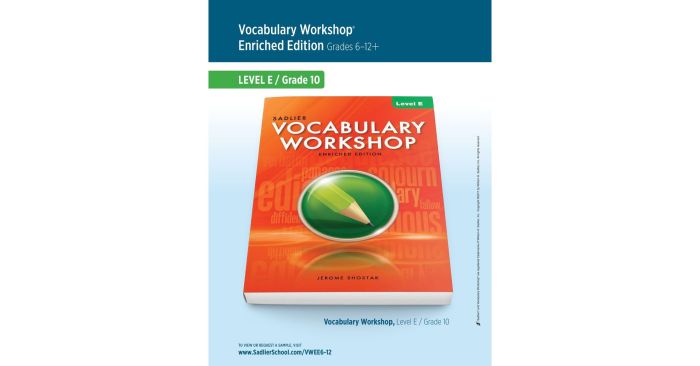Embarking on a journey of vocabulary enrichment, Vocabulary Workshop Unit 1 Level E provides a comprehensive guide for educators seeking to expand their students’ linguistic repertoire. This unit delves into effective vocabulary building techniques, explores diverse vocabulary categories, and emphasizes the importance of contextualizing vocabulary to foster deep understanding.
Through engaging activities, games, and assessments, this workshop empowers teachers with practical strategies to cultivate a rich vocabulary in their students, equipping them with the linguistic tools necessary for academic success and beyond.
Vocabulary Building Techniques

Vocabulary expansion is crucial for Level E students to enhance their reading comprehension, writing fluency, and overall communication skills. Here are effective techniques to build vocabulary:
- Contextual Learning:Immerse students in rich texts and authentic materials to encounter new words in meaningful contexts.
- Word Roots and Affixes:Teach the etymology of words, breaking them down into their root words and affixes to expand understanding.
- Visual Aids:Utilize flashcards, images, and diagrams to make vocabulary learning more engaging and memorable.
- Interactive Games:Design games like charades, Pictionary, or word puzzles to make vocabulary practice fun and competitive.
Vocabulary Categories: Vocabulary Workshop Unit 1 Level E
Unit 1 Level E encompasses a wide range of vocabulary categories that cater to students’ diverse learning needs:
- Academic Vocabulary:Terms and concepts related to academic subjects like science, math, and social studies.
- Content-Specific Vocabulary:Words and phrases specific to the unit’s themes, such as “ecology” or “diversity.”
- Figurative Language:Similes, metaphors, and other literary devices that enhance comprehension.
li> Cultural Vocabulary:Words and expressions that reflect the diverse cultures represented in the unit.
Contextualizing Vocabulary

Teaching vocabulary in context is essential for deep understanding. Strategies include:
- Using Real-World Examples:Connect vocabulary words to real-life experiences and situations.
- Authentic Texts:Utilize articles, stories, and other authentic texts to expose students to vocabulary in natural contexts.
- Visuals and Illustrations:Incorporate images, diagrams, and videos to enhance comprehension and make learning more interactive.
Vocabulary Games and Activities
Engaging games and activities reinforce vocabulary learning and make it enjoyable:
| Purpose | Activity | Implementation |
|---|---|---|
| Review | Word Wall: Display vocabulary words on a bulletin board for ongoing reference. | Post words and encourage students to add to the wall throughout the unit. |
| Practice | Vocabulary Bingo: Create bingo cards with vocabulary words and call out definitions or synonyms. | Divide students into teams and let them compete for bingo. |
| Application | Storytelling with New Words: Have students create short stories using the new vocabulary. | Provide sentence starters or story prompts to scaffold student writing. |
Assessment and Evaluation
Assessing vocabulary progress is crucial for effective instruction. Methods include:
| Assessment Type | Purpose | Benefits |
|---|---|---|
| Formative Assessment | Monitor progress | Provides ongoing feedback for adjustment. |
| Summative Assessment | Measure achievement | Evaluates student understanding at the end of the unit. |
| Vocabulary Journals | Student self-assessment | Allows students to track their own vocabulary growth. |
FAQ Section
What are the key vocabulary building techniques covered in Unit 1 Level E?
Unit 1 Level E focuses on effective vocabulary building methods such as repeated exposure, active recall, spaced repetition, and meaningful context.
How does the unit address the significance of vocabulary categories?
The unit identifies and discusses various vocabulary categories, including academic, subject-specific, and general vocabulary, highlighting their importance in expanding students’ vocabulary.
Why is contextualizing vocabulary emphasized in the unit?
Contextualizing vocabulary allows students to understand and retain new words more effectively by presenting them in real-world examples or authentic texts.